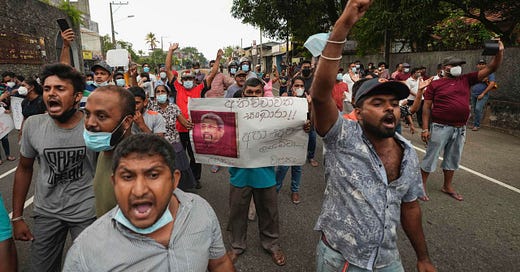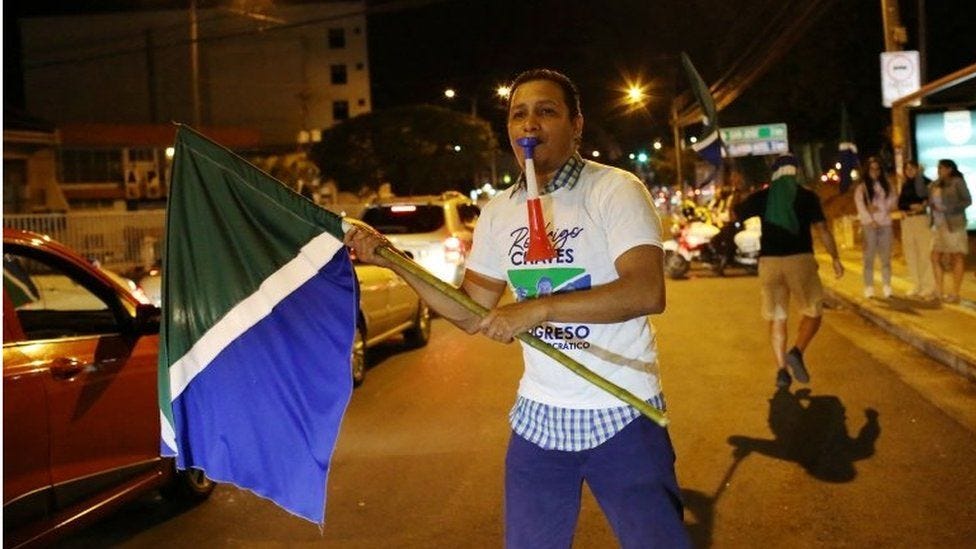Emerging Markets Daily - April 4
Sri Lanka Protests Rock Country, Macron Calls for Ban on Russia Oil, $135 Avg Oil Price in 2022: MUFG, Costa Rica's New President, Jumia Shares Surge on UPS Deal
The Top 5 Stories Shaping Emerging Markets from Global Media - April 4
Sri Lanka Unity Cabinet Offers Fails to Quell Anti-Rajapaksa Revolt
Nikkei Asia
“Overnight resignations of Sri Lankan cabinet members and an invitation to form a unity government have failed to quell public anger over the country's economic crisis, with thousands taking to the streets on Monday to demand the resignations of President Gotabaya Rajapaksa and his elder brother, Prime Minister Mahinda Rajapaksa.”
“The country awoke to news that the entire cabinet had offered to quit, including Finance Minister Basil Rajapaksa and Youth and Sports Minister Namal Rajapaksa. However, despite nonstop calls for the president and his brother to step down, they appeared determined to remain in office.”
“On Monday, President Rajapaksa extended an invitation to all political parties in parliament to accept ministerial posts and help find a solution to skyrocketing inflation, daily power cuts and severe shortages of essentials. The invitation was met with skepticism.”
“Shanakiyan Rajaputhiran Rasamanickam, from the opposition Tamil National Alliance, said the TNA would not accept the offer. ‘They have ruined the country,’ he said of the Rajapaksa government, ‘and now they are inviting everyone to join and share the responsibilities for the bad actions.’
“As a temporary measure, the president tweaked his cabinet, including by appointing Ali Sabry to replace Basil Rajapaksa as finance minister. But several ministers were simply reappointed to their old posts: G.L. Peiris as foreign minister, Dinesh Gunawardena as education minister and Johnston Fernando as highways minister.”
“Rasamanickam called the temporary appointments ‘absolute rubbish. We want all the Rajapaksas to go, not just two or three,’ he told Nikkei Asia. ‘They are basically reshuffling the cards here.’” Nikkei Asia reports.
Macron Calls for Ban on Russian Oil As Biden Condemns ‘Brutal’ Putin
“‘There are very clear indications of war crimes,’ the French president said in an interview on France Inter radio on Monday. ‘What happened in Bucha demands a new round of sanctions and very clear measures, so we will co-ordinate with our European partners, especially with Germany.’”
Financial Times
“The US and French presidents called for a significant escalation of sanctions against Russia after reports of atrocities by its forces in Ukraine with Emmanuel Macron urging a ban on Russian oil and coal imports and Joe Biden proposing a trial for war crimes.”
“Macron and Biden on Monday joined a chorus of western condemnation after reports of civilian killings and mass graves emerged over the weekend from Bucha, a city about 25km north-west of Kyiv, and other areas that were until recently under Russian occupation.”
“‘There are very clear indications of war crimes,’ the French president said in an interview on France Inter radio on Monday. ‘What happened in Bucha demands a new round of sanctions and very clear measures, so we will co-ordinate with our European partners, especially with Germany.’”
“He added: ‘I think that on oil and coal we must be able to move forward. We should certainly advance on sanctions . . . We can’t accept this.’ He did not call for a ban on imports of Russian gas, which remains a crucial fuel source for Germany, Italy and some eastern European countries.”
“Biden, in his first comments on the killings in Bucha, vowed to ramp up sanctions on Russia and called for a trial to assess possible war crimes committed by Vladimir Putin’s forces in Ukraine. ‘This guy is brutal and what’s happening in Bucha is outrageous,’ Biden said of the Russian president as he returned to Washington on Monday from Delaware. ‘I’m going to continue to add more sanctions.’” The FT reports.
Oil Prices Could Average $135 in 2022 if Russia-Ukraine War Continues
The National
“Russia’s military aggression in Ukraine has introduced a risk premium in oil prices that is likely to remain embedded in markets for months, with average oil prices hitting $135 per barrel this year, MUFG Bank has said.”
“With little progress on the diplomatic front and Moscow facing the threat of more sanctions amid the protracting war, the price of Brent is expected to surge above $140 per barrel market in the second quarter of this year, Ehsan Khoman, director of emerging markets research for Europe, the Middle East and Africa at MUFG Bank, said in a research note on Monday.”
“Physical deliveries of Russian seaborne crude are set to collapse from the second quarter, which, combined with the simultaneous deficits of depleting inventories and thinning spare capacity, means oil prices will be materially higher in the near term.”
"‘Barring a breakthrough in peace negotiations, we believe that the price-induced demand destruction — the only practical mechanism currently available in a world devoid of inventory buffers and supply elasticity — necessary to reduce consumption becomes widespread by the third quarter, with a corresponding Brent price above $140 per barrel,’ Mr Khoman said.”
“‘We believe this is the maximum pain level that could jolt corporate activity, squeeze private consumption and ultimately begin to ease the market’s severe tightness.’ Brent, the global benchmark for two thirds of the world's oil, was 0.64 per cent higher at $105.1 per barrel at 1.07pm UAE time on Monday. West Texas Intermediate, the gauge that tracks US crude, rose 0.90 per cent to $102.2 a barrel.” Sarmad Khan reports.
Costa Rica Elects Economist to Presidency
BBC
“Economist Rodrigo Chaves has won the presidential election in Costa Rica, preliminary results suggest. The 60-year-old ran on a promise of shaking up traditional party politics in the Central American nation.”
“With almost all votes counted, he had a lead of more than five percentage points over ex-President José María Figueres. Turnout was the lowest in decades as voters expressed discontent with Costa Rica's struggling economy.”
“Many Costa Ricans said they were looking for a break with the politicians of the past, a trend which went against Mr Figueres, who comes from one of the country's most influential political families.”
“While Mr Chaves is not entirely new to politics - he did serve in the outgoing government of President Carlos Alvarado as economy minister for six months - he has emphasised his plan to break with what he calls ‘privileges’ of Costa Rica's established political parties.”
“Rodrigo Chaves has moved away from the country's traditional political parties and presented himself as a maverick and an outsider to the established order. He has said he is prepared to use referendums to bypass Congress and shake up the usual stable political system in the Central American nation.”
“In large part, he benefited from widespread discontent in the country, as Costa Ricans are frustrated at what they see as worsening corruption in a country whose tourism-based economy has been badly affected by the coronavirus pandemic.” BBC reports.
Jumia Shares Surge on UPS Partnership News to Expand Across Africa
Bloomberg
“Jumia Technologies AG surged the most in about 20 months after an agreement that will see United Parcel Services Inc. use the pan-African e-commerce company’s distribution network to expand on the continent.”
“Jumia’s American depositary receipts jumped as much as 30% at 11:07 a.m. on the New York Stock Exchange, the biggest gain since Aug. 3, 2020. The deal will enable Atlanta-based UPS to build a greater presence in a number of African markets and tap into an anticipated boom in online retail, Renzo Bravo, head of strategy for the Indian subcontinent, Middle East and Africa, said in an interview.”
“‘We believe that Africa has the potential to reach around $180 billion in online trade by 2025,’ Bravo said. ‘That will enable growth and commerce, not only across Africa, but also from the continent to the world and from the world to Africa.’”
“For Jumia, the deal will enable the Berlin-based firm to make use of UPS’s network across 220 countries and territories to help users deliver their packages, according to senior vice president of logistics, Apoorva Kumar. The collaboration will start in Nigeria, Morocco and Kenya, with the aim to add more countries, he said.”
“The rally helped Jumia become a $1.2 billion company from $934.6 million on Friday. UPS shares fell 1.2%. The companies didn’t provide financial terms of the deal.”
“Jumia was founded by French entrepreneurs Sacha Poignonnec and Jeremy Hodara in 2012 and has about 8 million customers. The group has aimed to take the lead in e-commerce on a continent that is increasingly connected, though challenges still include a relatively low internet penetration and difficulties with mapping -- including in major cities like Lagos.” Loni Prinsloo reports.
Dear Friends, Colleagues, Fellow Travelers: It has come to my attention that EM Daily April 3 did not land in in-boxes. My apologies for technical difficulties. You can still read it and all content from Emerging World over at the site - Emerging World.
I send you my warm regards from overcast Miami (on a short visit). Cheers, Afshin
“What matters in life is not what happens to you but what you remember and how you remember it.” - Gabriel Garcia Marquez





